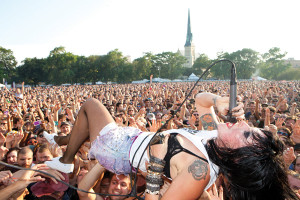The 2013 Pitchfork Music Festival is just around the corner, kicking off on July 19. Every summer the festival takes over Union Park in Chicago for three days of impressive and provocative music and has become a staple event in the neighborhood. Since its inception in 2006, the festival has grown into one of the most internationally renowned exhibitions of music and art, providing attendees with a wide variety of big name and unknown artists. Chris Kaskie, Pitchfork’s charismatic and dedicated president, sat down with Performer to talk the 2013 line up and future plans.
How did the Pitchfork Festival come about?
We wanted to find new ways to reach our fans and the festival was designed to showcase the purpose and content of the magazine in the real world setting. When we first started the festival, we viewed is as a way to expand our presence and connect with our audience. The idea and creation of the festival was very organic, we new we wanted to bring together talented artists and we knew we wanted to do it in a way that was engaging to our fans.
How do you and your team choose the festival line up every year?
We think about our content, about what our fans want to see and then try to create something that’s unique from year to year. The curation process has evolved but is really just a group of us in a room hashing through all the things we’d like to see and the things we think our fans would like to see. The variety of bands is really important and there isn’t one thing we look for or one approach we take. We sit down and figure out who is new and who we’ve never had before. We try to bring a good mix of emerging and well-established acts. Honestly, we think about the acts that we’ve dreamt of having.
How do you choose your headliners?
We don’t really approach the process by trying to first determine who will or won’t headline. We take the festival as a whole and instead we look at what acts we want. The team looks at who has played in previous years and tries to figure out who the fans want to see most. We take careful care when deciding and really want to get acts in that we feel will be the most fun and will bring something new to the festival each year.
Is there anything that bands can do to make the line up? Any advice you give those interested in being chosen for 2014?
Not really. It’s an outreach process for us; we go searching for the artists we want. While variety and range are important and while we want to showcase up-and-coming bands, we really don’t look at demos or materials submitted by bands. Instead our team works with agents to find bands that will be the best fit for the year. Even though materials may come across our desks, we don’t really put out a call for bands. We look for what will be the best fit.
http://www.youtube.com/watch?v=O8fGC82FS5o
When creating your line up, do you and the team draw from years past? Do you invite bands to return or try to create something totally unique from year to year?
We’ve had bands perform multiple times and there’s no hard and fast rule about that. That said, we try to get as much new as we possibly can. On average, about ninety-five percent of what we have is stuff we’ve never had before. In year’s past we’ve had unknown artists and bands who are well established, and if having a band return feels right, we’ll do it. We definitely want the festival to be the most fun and most daring it can be and that means striving for creativity and giving the fans something new and exciting every year.
How has the festival grown over the years?
We’ve gotten much bigger. Over the years we’ve added more days and more bands. We’ve expanded the structural organization and improved the caliber of booking. But the festival has grown primarily in terms of production, services available to attendees and the behind-the-scenes operations. We’ve really tried to make the entire festival run more smoothly. We’re always looking at possibilities for growth and expansion but our location is a key component. We’ve really become apart of the neighborhood and we don’t want to lose that.
Where do you see it in the next five or ten years?
It’s hard to say. I think we’re pretty comfortable in the location we’ve been in. We’ve been here for nine years and the audience is happy here. The arguments for getting bigger always stay the same and we have expanded internationally, but it’s about setting realistic expectations year after year. Keeping things easily accessible for attendees and staying all about the music is the main goal. We could get bigger but we don’t want to go crazy and we don’t the festival to become something over-the-top or driven by sponsors. It’s not about money, it’s about the fans and the music and the magazine. This festival means something to Chicago and to our readers and fans and we want to continue to improve, but never lose that connection.
For more info, visit pitchforkmusicfestival.com
Sleigh Bells photo by Rebecca SmeyneI

